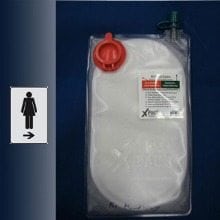
On September 19, 2011, QinetiQ North America revealed the outcome of a successful experiment accomplished on board the final flight of the space shuttle Atlantis (STS-135) back in July.
The experiment is the first of its kind in microgravity. It tested a new application in space of a technology modeled on a biological process used by cells on Earth to recover water from their environment. This is already engineered for use in applications ranging from desalination plants to treating non-potable water for backpackers. Forward osmosis is the natural diffusion of water through a semi-permeable membrane that allows tiny polar molecules such as water to pass through, while preventing viruses or bacteria from getting in. Prior to this experiment, converting undrinkable water into potable fluid in reduced gravity was unheard of. The experiment, tested on the shuttle, showed that the process was almost as successful in microgravity as it was in reduced gravity.
Scientists and researchers from QinetiQ North America and NASA worked together with the creators of X-Pack, a commercially available water filter product, to develop the Forward Osmosis Bag (FOB), which is a passive, personal, portable water purification device. This experimentation involved a combination of indicator dyes while calculating the effect of mechanical mixing. The Kennedy Space Center will be conducting more studies later this month.
“If we discover that manual manipulation helps, then we hope a long-term application would result in a spacesuit which would induce the mechanical mixing as astronauts move around during spacewalks,” said Monica Soler, QinetiQ North America Project Engineer.
QinetiQ North America delivers world-class technology, responsive services, and innovative solutions for global markets, focusing on US government and commercial customers.

